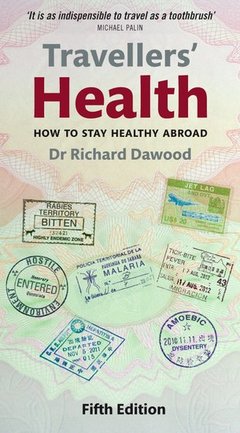Travellers' Health (5th Ed.) How to stay healthy abroad
Langue : Anglais
Coordonnateur : Dawood Richard

Our ability to travel to the remotest parts of the world has been transformed, but the health risks are ever changing and increasing, and there may be no one to help when things go wrong. Whether you are travelling abroad for business or pleasure, this book provides essential, detailed, practical advice for journeys all over the world. This fifth edition is a complete revision of a best-selling, comprehensive and trusted guide. Travellers need to be increasingly well informed about health problems they may encounter abroad. Malaria prevention, the latest vaccine information and advice, cruise ship travel, jet lag, skiing, and accidents and injuries abroad: this book covers every important issue in travel medicine, with the emphasis firmly on self-help and prevention. This new edition brings together state-of-the-art background information and specialist advice from more than 70 leading experts from several countries, now in a more compact format. It is also available in an electronic edition. Travellers' Health is the standard source for the well-prepared traveller.
1. INTRODUCTION: STAYING HEALTHY ABROAD. 1.1. Introduction. 1.2. Staying healthy abroad: prevention is the best strategy. 2. FOOD AND HYGIENE RELATED DISEASE RISK. 2.1. Diarrhoea and intestinal infections. 2.2. Parasites from infected food and drink. 2.3. Poliomyelitis. 2.4. Viral hepatitis. 2.5. Poisons and contaminants in food. 3. WATER-RELATED DISEASES. 3.1. Safe water. 3.2. Water purification devices. 3.3. Recreational water and beaches. 3.4. Algal blooms. 4. DISEASES OF CONTACT. 4.1. Tuberculosis. 4.2. Tetanus. 4.3. Diphtheria. 4.4. Schistosomiasis (bilharzia). 4.5. Meningococcal Disease. 4.6. Legionnaires' disease. 4.7. Worm infections from soil contact. 4.8. Leprosy. 4.9. Anthrax. 4.10. Viral hemorrhagic fevers. 4.11. Leptospirosis. 4.12. Influenza A and B. 5. DISEASES SPREAD BY INSECTS. 5.1. Malaria. 5.2. Arboviruses: dengue, JJapanese encephalitis, yellow fever and others. 5.3. Filarial infections. 5.4. Lyme disease. 5.5. Leishmaniasis. 5.6. Sleeping sickness (African trypanosomiasis). 5.7. Chagas disease (South American trypanosomiasis). 5.8. Plague. 5.9. Typhus: The rickettsial infections. 5.10. Myiasis (maggot infestation). 5.11. Fleas, lice, bugs, scabies, and other creatures. 5.12. Personal protection against insect pests. 6. ANIMAL ATTACKS, RABIES, VENOMOUS BITES AND STINGS. 6.1. Animal attacks, rabies, venomous bites and stings. 7. AIR AND SEA TRAVEL. 7.1. Air travel. 7.2. Jet lag. 7.3. Motion sickness. 7.4. Cruise Ship Medicine. 8. ENVIRONMENTAL AND RECREATIONAL HAZARDS. 8.1. Accidents. 8.2. Personal safety and security. 8.3. Altitude illness. 8.4. Effects of climatic extremes. 8.5. Sun and the traveler. 8.6. Hay fever seasons worldwide. 8.7. Yachting and sailing: 'nautical tourism'. 8.8. Swimming, diving and water sports. 8.9. Snow sports. 9. SOME COMMON PROBLEMS. 9.1. Skin problems. 9.2. Dental problems. 9.3. Eye problems. 9.4. Foot care. 9.5. Skin and soft tissue infections. 9.6. Respiratory and airborne problems in travellers. 9.7. Gynaecological problems. 9.8. Psychological disorders. 9.9. Fever and undifferentiated febrile illnesses. 10. SEXUAL CONTRACEPTION ABROAD. 10.1. Sexually transmitted infections. 10.2. Human Immunodeficiency Virus (HIV). 10.3. Contraception and travel: be safe, be prepared. 11. TRAVELLERS WITH SPECIAL HEALTH NEEDS. 11.1. Travel in pregnancy. 11.2. Children abroad. 11.3. Elderly travellers. 11.4. The traveller with diabetes. 11.5. The immunocompromised traveller. 11.6. The disabled traveller. 11.7. Expedition Medicine. 11.8. Medical Tourism. 11.9. Health protection of Armed Forces personnel. 12. LIVING AND WORKING ABROAD. 12.1. Becoming an expatriate. 12.2. Fitness for working abroad. 13. PREPARING FOR TRAVEL. 13.1. Risk and risk assessment for travellers. 13.2. Immunization. 13.3. Travel insurance: the whys, whats and hows. 13.4. Travel law. 13.5. Medicines and medical kits. 13.6. Blood transfusion, blood products and the traveller. 14. EMERGING INFECTIONS: THE FUTURE. 14.1. Emerging infections and the international traveller. APPENDIXES. Appendix 1: Vaccination requirements and recommendations. Appendix 2: Resource Guide. Appendix 3: Some hints on eating abroad under extreme conditions of bad hygiene. Appendix 4: Medical Kit Checklist. Appendix 5: Post-travel health screening. Appendix 6: Hay fever seasons worldwide. Further reading. Glossary. Index.
Dr Richard Dawood trained in medicine at University College London, has studied at the Liverpool School of Tropical Medicine & Hygiene, and practised in a variety of clinical settings at teaching hospitals in the UK and overseas before establishing the Fleet Street Clinic in 1995, which is one of the UK's leading independent centres for Travel Medicine. His specialist interests include pre-travel and post-travel care of high-risk travellers, and looking after news media professionals in war zones and hostile environments. He is a medical adviser to several international TV networks and news agencies. He has been involved in Travel Medicine for more than thirty years, has personal experience of travel in more than 100 countries around the world, and writes and broadcasts frequently on Travel Health issues.
Date de parution : 09-2012
Ouvrage de 562 p.
10.2x18.1 cm
Thème de Travellers' Health :
© 2024 LAVOISIER S.A.S.
